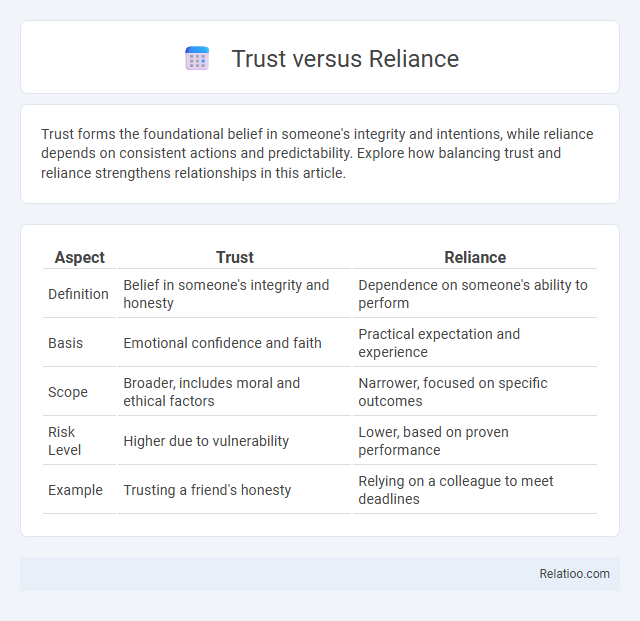Trust forms the foundational belief in someone's integrity and intentions, while reliance depends on consistent actions and predictability. Explore how balancing trust and reliance strengthens relationships in this article.
Table of Comparison
| Aspect | Trust | Reliance |
|---|---|---|
| Definition | Belief in someone's integrity and honesty | Dependence on someone's ability to perform |
| Basis | Emotional confidence and faith | Practical expectation and experience |
| Scope | Broader, includes moral and ethical factors | Narrower, focused on specific outcomes |
| Risk Level | Higher due to vulnerability | Lower, based on proven performance |
| Example | Trusting a friend's honesty | Relying on a colleague to meet deadlines |
Understanding Trust and Reliance
Trust involves a confident belief in the integrity, ability, or character of a person or system, whereas reliance emphasizes the action of depending on someone or something for support or help. Understanding trust centers on emotional and cognitive factors that build confidence over time, while reliance is more transactional and task-oriented, often established through consistent performance. Your decision-making improves significantly by distinguishing between trusting motivations and the practical necessity of reliance within risk assessments.
Core Differences Between Trust and Reliance
Trust involves a belief in the integrity and intentions of a person or entity, while reliance is the act of depending on something for support or help. Trust is inherently emotional and subjective, reflecting confidence in future behavior, whereas reliance is more practical and objective, centered on the availability and functionality of resources or systems. Risk arises when dependence on trust or reliance exposes one to potential loss or uncertainty.
Psychological Foundations of Trust
Trust is a cognitive and emotional state rooted in the anticipation of positive intentions and behavior from others, influenced by early attachment experiences and social learning. Reliance depends on the assessment of an entity's reliability and predictability, often based on past interactions and empirical evidence. Risk involves the perceived uncertainty and potential negative outcomes in a situation, which trust aims to mitigate by fostering expectations of safety and cooperation.
The Role of Reliance in Relationships
Reliance in relationships functions as a practical foundation where individuals depend on consistent support and predictable outcomes, distinct from trust which involves deeper emotional confidence. While trust encompasses belief in integrity and intentions, reliance is based on observable actions and reliability in fulfilling obligations. Assessing reliance helps manage risk by identifying dependable behaviors that reduce uncertainty and enhance relationship stability.
Trust vs Reliance in Professional Settings
Trust in professional settings involves a deep confidence in a colleague's integrity and intentions, while reliance centers on depending on their skills and performance to achieve specific outcomes. Your ability to build trust fosters long-term collaboration and open communication, whereas reliance may be limited to task completion without emotional commitment. Understanding the distinction can enhance team dynamics and improve project success rates by aligning expectations accordingly.
Building Trust vs Fostering Reliance
Building trust involves establishing credibility and emotional confidence through consistent, transparent actions and ethical behavior, fostering long-term relationships. Fostering reliance emphasizes creating dependable systems and processes that ensure predictable outcomes and reduce uncertainty. Effective risk management integrates both trust and reliance to balance emotional assurance with practical reliability in decision-making.
When Reliance Erodes Genuine Trust
Reliance often depends on consistent performance, but when failures occur, Your confidence may shift from trust to caution, highlighting the vulnerability in purely transactional relationships. Genuine trust integrates emotional bonds and shared values, which remain intact despite occasional breaches in reliance. Understanding the distinction helps manage risk by balancing expectation with resilience in personal and professional interactions.
Cultural Perspectives on Trust and Reliance
Cultural perspectives significantly shape the concepts of trust and reliance, with collectivist societies emphasizing relational trust built through shared experiences and group cohesion, while individualistic cultures prioritize reliance on formal agreements and documented accountability. East Asian cultures often view trust as a long-term, interpersonal bond requiring continuous nurturing, contrasting with Western approaches that may treat trust as conditional and transactional. Understanding these cultural nuances is crucial for effective cross-cultural communication and risk management in global partnerships.
Impact of Technology on Trust and Reliance
Technology significantly reshapes trust and reliance by automating decisions and enabling data transparency, thereby reducing uncertainty but also introducing new vulnerabilities. Your ability to rely on digital systems hinges on cybersecurity measures and algorithmic integrity, which directly influence perceived trustworthiness. As technology evolves, balancing innovation with risk mitigation becomes crucial to maintaining confidence in digital interactions.
Nurturing Both: Strategies for Balance
Nurturing both trust and reliance requires transparent communication, consistent performance, and clearly defined expectations to mitigate risk effectively. Balancing these elements strengthens relationships by fostering accountability while allowing for flexibility in uncertain situations. Implementing regular feedback loops and risk assessments ensures that trust remains justified and reliance does not lead to vulnerability.

Infographic: Trust vs Reliance
 relatioo.com
relatioo.com